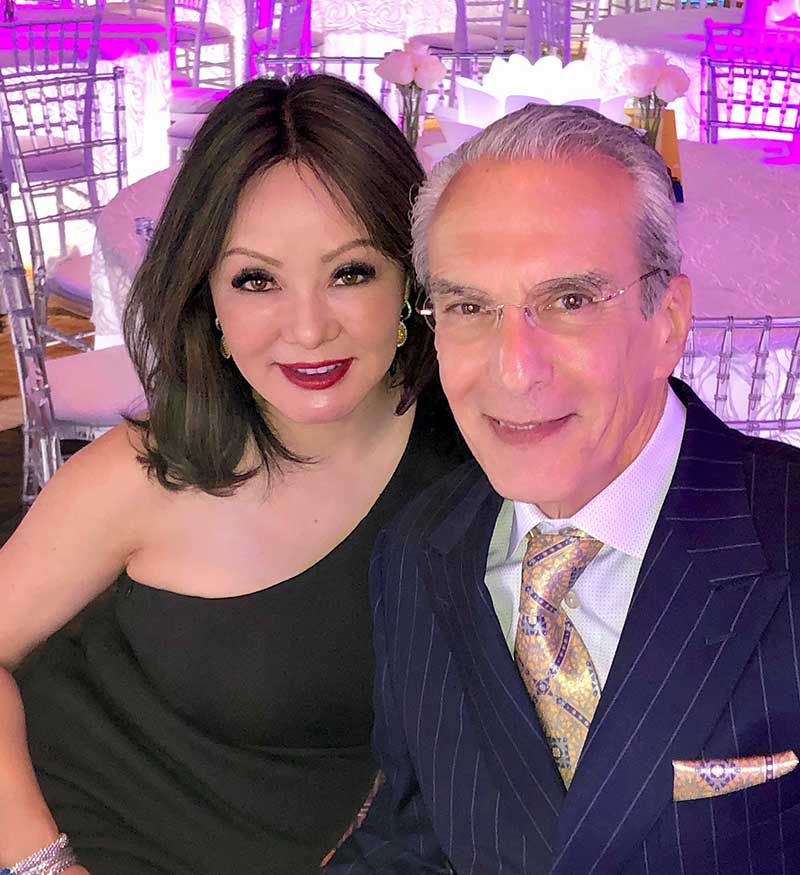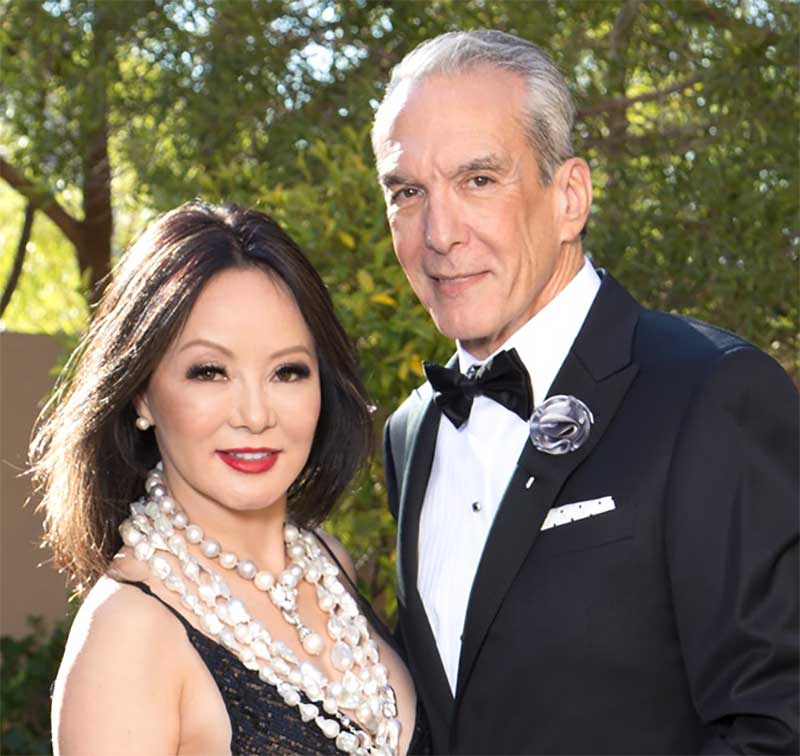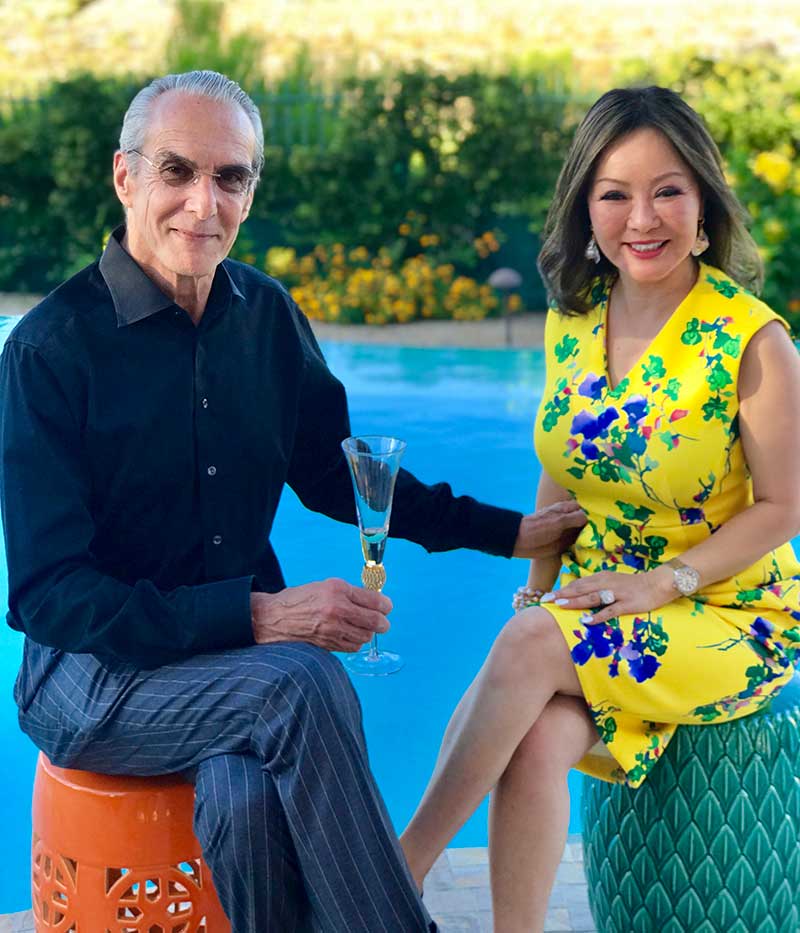
This article was printed in
Chic Compass Magazine – Issue 8

Hope on the Horizon
DR. KATE ZHONG & DR. JEFFREY CUMMINGS:
THE LIKE-MINDED ALZHEIMER’S AMBASSADORS OF LAS VEGAS
BY STACEY GUALANDI
Alzheimer’s patients and their loved ones have a renewed sense of hope now that the U.S. Food & Drug Administration approved the first Alzheimer’s drug in nearly two decades.
Dr. Kate Zhong, MD, MSC, FRCP (C), and her husband Dr. Jeffrey Cummings, MD, SCD, said the historic decision—announced coincidentally in June during Alzheimer’s and Brain Awareness month—will give doctors the ability to treat patients with Biogen’s Aducanumab (under the brand name Aduhelm) in the early phases of the irreversible, progressive brain disorder.
“This is great news for the world,” says an enthusiastic Dr. Zhong. “The drug is not just tackling the symptoms, but it can potentially change the overall course of Alzheimer’s disease.”
Adds Dr. Cummings, “We think we have turned the corner in the field of being able to slow Alzheimer’s disease down.”

Dr. Kate Zhong & Dr. Jeffrey Cummings
This watershed moment couldn’t come soon enough for these Las Vegas-based brain experts. They have been on the frontline of the fight against this disease for decades and were the driving force behind the clinical trial that led to the drug’s path to passage.
“If you look at the very best trial data that we have right now, these drugs slow the disease by about 50 percent, which is tremendous,” says Dr. Cummings, a key advisor to Biogen. “But it means that 50 percent of that disease is still going on, despite a very good response to this drug, so we’re in it for the long haul because we understand that it’s a breakthrough, but it’s not enough.”
Dr. Cummings would know. He is currently the #3 scientist and world-renowned Alzheimer’s researcher who received the Alzheimer’s Association’s Lifetime Achievement Award three years ago.
Dr. Zhong earned her medical degree in China and trained as a psychiatrist/pharmacologist in Canada. She is a passionate health advocate who was honored with the Las Vegas “Healthcare Headliner Research Award” for creating the Cleveland Clinic’s healthybrains.org.
Together, they are currently hard at work, building and expanding research initiatives as professors at the Chambers-Grundy Center for Transformative Neuroscience within UNLV’s department of brain health.
“It’s all about how to do clinical trials better,” says Dr. Cummings. “I’m working with the brightest minds—computer scientists, engineers, neuroscientists—to innovate Alzheimer’s clinical research. I’m very excited to receive a $6 million endowment, and $3 million in National Institutes of Health (NIH) funding to continue this work.”
For 16 years, Drs. Cummings and Zhong have shared not only a passion for combatting neurodegenerative diseases but also a passion for each other.
In 2005, they said ‘I do’ in Las Vegas, proving that like minds definitely attract.
“Back when I was in my residency training, I read his textbook like a Bible,” says Dr. Zhong. “I had yellow highlighters and all these sticky notes. I had no idea what he looked like, but I said, ‘This guy is really good. HA!’.”

Dr. Kate Zhong & Dr. Jeffrey Cummings
While Dr. Zhong had an aunt with dementia, Dr. Cummings says his medical career wasn’t motivated by family history. But both found studying the human brain fascinating.
“As a student, I just fell in love with this whole idea of biology and philosophy, and the mind/brain intersection. The way forward in that is science,” says Dr. Cummings.
“I treated many patients with depression, anxiety disorder, schizophrenia,” adds Dr. Zhong. “But what I fell in love with was my Alzheimer’s patients; although they didn’t remember much of what they were experiencing on a day-to-day basis, they were able to tell me their fascinating life stories, such as during World War II. That really inspired me to say: ‘What if we have something that can stop this disease? What if we can reverse this and then they can regain their precious memory?’”
Now, they have focused all of their work on brain disorders—specifically Alzheimer’s—a disease they say kills 350 people every day.
“The diseases are not getting more common,” says Dr. Cummings. “They are more frequent in the population because the population is aging, and it’s all driven by aging.”
Following his successful tenure as director of not one but two research and neurotherapeutic centers at UCLA, Dr. Cummings was recruited by the Cleveland Clinic as founding director, and Dr. Zhong as the senior director for research, to build the Lou Ruvo Center for Brain Health’s programs from scratch. They moved to Las Vegas in 2010, where they had previously tied the knot, and never looked back.
“Before we came to Las Vegas, it wasn’t a city that was known for researching Alzheimer’s,” says Dr. Zhong. “Some people were like, ‘Are you losing your mind?’ jokingly. [But] I think we feel very proud of what we have done for the city, which we love.”

Dr. Jeffrey Cummings & Dr. Kate Zhong
“I think we elevated the level of science in the city, and we’ll continue to do that,” adds Dr. Cummings. “I got the first major grant from the NIH that came into Southern Nevada to support neuroscience.”
Also, while at the Center, they were instrumental in initiating the clinical trial for Aduhelm, ultimately putting the city they now call home on the map for brain research advancements.
“Now, with the same passion, the same drive, and the same network of resources, we’re going to continue to do more with UNLV and beyond,” says Dr. Zhong. “I consider both of us as the ambassadors for the city of Las Vegas.”
And according to their recently published 6th annual “Alzheimer’s Disease Drug Development Pipe-line” report, there is even more good news on the Alzheimer’s front: three other potential drugs are now in the FDA’s approval pipeline.
“We learned so much from COVID,” says Dr. Cummings. “Professor COVID taught us how the FDA can work fast under great pressure; how great science can accelerate the speed of research; and how important the patient’s participation is to finding new treatments.”
Both admit they have their work cut out for them, but these Alzheimer’s ambassadors say they are committed to this new drug, to brain health, to the patients and families living with Alzheimer’s, and to each other, in the hope of preventing this disease for good.
After all, the couple who fights Alzheimer’s together stays together.
